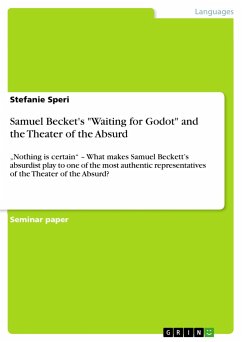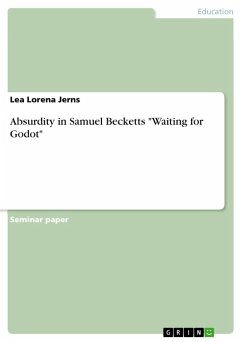Seminar paper from the year 2011 in the subject Didactics - English - History of Literature, Eras, grade: 1,3, Humboldt-University of Berlin (Institut für Anglistik und Amerikanistik), language: English, abstract: "Waiting for Godot" is not only one of the most famous works of Samuel Beckett; it is also one of the most popular creations of the genre of the Theater of the Absurd. Originally written in French, Beckett's play was first performed in the Théâtre de Babylon in Paris in 1953 (cf. Beckett 128) and confronted its audience with the circumstance of the "nonappearance of the person awaited so faithfully by the two main protagonists". (Astro 114) The spectator shares this experience of waiting for someone who might not come with the characters which made it possible for Beckett to give his audience an understanding of the intentions of the absurdist drama. Waiting for Godot is not only completely detached from the conventions of the classic drama, namely the unity of time, place and action, this unity is instead substituted by illogical actions, absurd scenarios and dialogues that appear to be linked randomly. By some viewers perceived as boring and even mindless (cf. Beckett, The Critical Heritage 98), for others it is a work of genius with a profound statement. But what makes the two-act play to seem pointless and boring at first glance? This paper intends to illustrate that Waiting for Godot - being an absurdist drama - is isolated from the classic drama and its conventions and deals with the structural elements Beckett used to convey the absurdity and illogicality that the play is based on. After explaining the term absurd and outlining the formation of the Theater of the Absurd the paper focusses on structural elements of the absurdist drama in general. A short summary of Waiting for Godot is followed by the analysis of the play, concentrating on the connection of form and content especially by discussing characters and their actions, the time and place and the dialogues and language.








